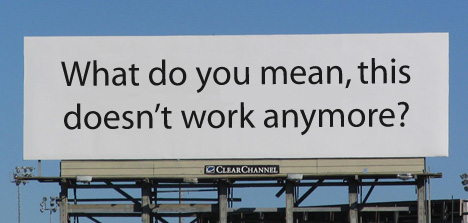
In a world where the tools of communication have become more ubiquitous than the automobile, change happens faster than ever before. Businesses are forced to focus on their agility, and marketers face a challenge that will likely turn that industry on its collective head.
Whether you’re aware of it or not, we’re in the midst of the biggest cultural paradigm shift not only of our time, but probably ever. When people refer to America’s youth as the MySpace generation, you know something’s up. So what’s really going on here? How can businesses embrace the sweeping changes that are riding the coattails of the information generation?
Bartender, gimme an old idea…with a twist
 It’s no secret that youth has typically served as the greatest catalyst for cutural change over the past fifty or so years. Look at rock ‘n roll in the late ’50s and early ’60s. Youth has always defined cool, but in previous iterations, did youth really define new, cutting-edge industries?
It’s no secret that youth has typically served as the greatest catalyst for cutural change over the past fifty or so years. Look at rock ‘n roll in the late ’50s and early ’60s. Youth has always defined cool, but in previous iterations, did youth really define new, cutting-edge industries?
In the past, I think young people with fresh ideas and unorthodox lifestyles have been forced to adapt their habits and beliefs to a world that wasn’t set up to accommodate them. It’s the square peg/round hole effect, and this attempt to reconcile two irreconcilable polar opposites often ends in depression, anger, and the idea of jaded youth.
Thanks to the massive cultural infiltration of communication tools, things have begun to change – probably a lot more than any of us originally anticipated! Vehicles like MySpace (and more generally, the internet) and cell phones have become so widespread that they are spinning off industries right and left to cater to the long tail of our society.
For years, youth has literally defined itself in niches, and now?
The niches are king.
Stay cool or get the hell out of the way
I mentioned long tail earlier, and I want to take a second to talk about the effects of this paradigm shift on “new” marketing.
If you’re not on the long tail, you’re mainstream. Big business is mainstream. To put it another way, big business ain’t cool. I’m not going to suggest that big business is going anywhere because there’s absolutely no cultural appeal there, but I am going to suggest that in the years ahead, people just won’t care. That is, unless these businesses can align themselves with the long tail…
Old media is a perfect example of what the long tail isn’t. MySpace, on the other hand, is a prime example of a long tail company. It’s so long tail, in fact, that it caters to the ultimate niche – the individual.
So, why would Rupert Murdoch, the head of a multimedia giant (NewsCorp), want to buy MySpace?
Because he recognized that, without the long tail, he was screwed.
With that in mind, what is the biggest challenge that marketers will face in the years ahead?
Creating a marriage between the short tail upon which businesses were founded and the long tail upon which their future survival will be dependent.
All of the market’s interest currently lies in the realm of the long tail. My generation has been beaten over the head with the messages of the short tail for so long that we have literally become deaf to them. If you can’t market to the long tail, then you can’t convert anyone in my age group. It’s that simple.
To put it another way…
If you’re not cool, we’re not listening.
The freedom of the long tail (or why don’t you get a job?)
One long tail industry that has had a significant cultural impact in the last three years is poker. I have friends, all of whom have different backgrounds and skills, who seriously consider the pursuit of poker as a primary source of income.
Although it seems a bit too risky to me, my friends could all make very good arguments to the contrary.
First and foremost, the poker industry has become huge. Before what I call the “poker boom,” poker was a niche pastime for those who played the game. Outside of Vegas, there wasn’t a huge industry revolving around it, and generally speaking, it was reserved for dark, smoky rooms in the basements of hundred year old brick buildings.
Second, this is yet another example of a long tail industry in a 2.0 world. I said earlier that the niches were king, and the growing popularity of poker serves as evidence of that fact.
When niches see industries develop around them, they become more than just niches.
They become viable business opportunities.
Welcome to the world of the long tail, where the unorthodox may not be so unorthodox after all, old timer ;-)